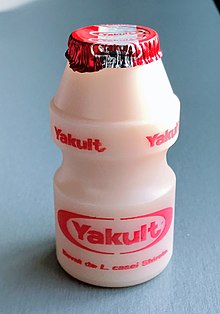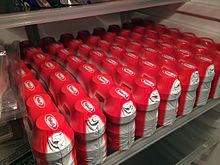| Revision as of 17:10, 5 September 2018 editJytdog (talk | contribs)Autopatrolled, Extended confirmed users, Pending changes reviewers, Rollbackers187,951 edits AfD closed as keep (nomination withdrawn).← Previous edit | Revision as of 17:12, 5 September 2018 edit undoJytdog (talk | contribs)Autopatrolled, Extended confirmed users, Pending changes reviewers, Rollbackers187,951 edits shovel out the spam-sourced dogshit and the health claims sourced to spam and primary sources. this is disgusting health marketing.Next edit → | ||
| Line 13: | Line 13: | ||
| ] | ] | ||
| {{nihongo|'''Yakult'''|ヤクルト|Yakuruto | {{nihongo|'''Yakult'''|ヤクルト|Yakuruto | ||
| }} is a ] ] made by ] a mixture of ] with a special strain of the ] '']'' Shirota. It was created by a Japanese scientist ], who graduated from the Medical School of ] in 1930. |
}} is a ] ] made by ] a mixture of ] with a special strain of the ] '']'' Shirota. It was created by a Japanese scientist ], who graduated from the Medical School of ] in 1930. | ||
| After its introduction in Japan and ], Yakult was first sold in ] in 1966,<ref>{{cite web|url=http://www.yakult.com.br/yakult/default.aspx?mn=200&c=215&s=0|title=Yakult - Saúde Global em Harmonia|website=www.yakult.com.br}}</ref> due to the large number of Japanese immigrants in the country, before it was marketed elsewhere. Today, Yakult is sold in 38 countries,<ref>{{cite web |url=http://www.yakulteurope.com/index.cfm?menuid=6 |title=Yakult Europe – Yakult worldwide |accessdate=2007-01-16 |work= }}</ref> although its bacteria cultures are provided from a mother strain from Japan regardless of production location.{{Citation needed|date=February 2007}} | |||
| Yakult is marketed in different sizes. In ] and ], ], ], ], and ] Yakult comes in 65 ml bottles. In the ] (one of Yakult's largest selling markets), ], ], ], the ], ], ] and ], 80 ml bottles are available. It is also available in ], ], ] and ] where Yakult comes in 100 ml bottles.<ref>{{cite web |url=http://www.yakultusa.com/ |title=Yakult USA |accessdate=2007-01-16 |work= }}</ref><ref>{{cite web |url=http://www.yakult.com.au/product01.htm |title=Yakult Australia – What is Yakult? |accessdate=2007-01-16 |work= }}</ref><ref>{{cite web |url=http://www.yakult.com.tw/ |title=Yakult Taiwan |accessdate=2007-01-16 |work= }}</ref> | |||
| The product is made by {{nihongo|Yakult Honsha Co., Ltd.|株式会社ヤクルト本社|Kabushiki-gaisha Yakuruto Honsha}} ({{tyo|2267}}), where ] has a 20% share. The company also owns one of Japan's major ] franchises, the ]. It has been also one of the partner companies of the ] since 2005. | The product is made by {{nihongo|Yakult Honsha Co., Ltd.|株式会社ヤクルト本社|Kabushiki-gaisha Yakuruto Honsha}} ({{tyo|2267}}), where ] has a 20% share. The company also owns one of Japan's major ] franchises, the ]. It has been also one of the partner companies of the ] since 2005. | ||
| ==Nutritional value== | |||
| Standard Yakult (excludes variations such as in Yakult Light) contains:<ref>{{cite web |url=http://www.yakult.com.au/health01.htm |title=Yakult Australia – Nutritional Information |accessdate=2007-01-16 |work= }}</ref> | |||
| *] (], ]) | |||
| *Skimmed ] | |||
| *Flavours | |||
| *Live ''Lactobacillus casei'' Shirota strain, 6.5 billion per 65 ml bottle (concentration of 10<sup>8</sup> CFU/mL) | |||
| *Water | |||
| Standard Yakult contains 14g of sugar for every 100g, but comes in 65 ml bottles. This ] is higher than the level defined as "HIGH" by the UK Food Standards Agency (described for concentrations of sugar above 15g per 100g).<ref>{{cite web|url=http://www.eatwell.gov.uk/healthydiet/fss/sugars/ |title=Food Standards Agency – Healthy Diet – Sugars |publisher=Eatwell.gov.uk |date=2011-03-29 |accessdate=2011-11-17}}</ref> Based on the existence of many products like Yakult in the world market and the content of milk protein (1.4 g per 100 ml),<ref>http://www.yakulteurope.com/index.cfm?menuid=2&ContentID=14</ref> | |||
| it was classified as a fermented milk named "Fermented Milk Drinks" of the Codex Standard. | |||
| Through nutrient profiling guidelines, current health claim regulation in ] may forbid the use of health claim on food products that are nutritionally unbalanced, but dairy products and probiotic drinks are likely to be considered as favourable carrier because their health benefits outweigh the fact they might be high in one of the designated 'unhealthy' ingredients.<ref>{{cite web|url=http://www.nutraingredients.com/news/ng.asp?id=83569|title=Nutraingredients.com|date=|publisher=Nutraingredients.com|accessdate=2011-11-17}} | |||
| <!-- link does not work - replaced with the current UK food agency recommendation - While many people take Actimel to improve their health, they are often unaware of the high amount of sugar they are consuming.<ref>[http://www.timesonline.co.uk/tol/newspapers/sunday_times/scotland/article581810.ece Bacteria-rich health drinks contain 80% more sugar than cola --></ref> | |||
| === Scientific basis === | |||
| According to the manufacturer's website, the benefits of Yakult consumption are supported by an array of scientific studies.<ref> {{webarchive |url=https://web.archive.org/web/20080409193210/http://www.yakult07.co.uk/Public/hcp/yakult_the_product/history.aspx |date=April 9, 2008 }}</ref> Those could range from maintenance of ],<ref> {{webarchive |url=https://web.archive.org/web/20080119114355/http://www.yakult07.co.uk/Public/hcp/yakult_lcs/healthy_microbiota.aspx |date=January 19, 2008 }}</ref> "modulation" of the ],<ref name="yakult07"> {{webarchive |url=https://web.archive.org/web/20080409193118/http://www.yakult07.co.uk/Public/hcp/yakult_lcs/immune_modulation.aspx |date=April 9, 2008 }}</ref> regulation of bowel habits and ]<ref> {{webarchive |url=https://web.archive.org/web/20080409193053/http://www.yakult07.co.uk/Public/hcp/yakult_lcs/bowel_habit.aspx |date=April 9, 2008 }}</ref> and finally effects on some ]s.<ref> {{webarchive |url=https://web.archive.org/web/20080119114350/http://www.yakult07.co.uk/Public/hcp/yakult_lcs/gastrointestinal_infections.aspx |date=January 19, 2008 }}</ref> | |||
| Although the number of scientific papers is large, most of them are based on '']'' and ''in vivo'' experiments, with some human clinical trials done on cohorts<ref>{{cite journal |vauthors=Takeda K, Okumura K |title=Effects of a fermented milk drink containing Lactobacillus casei strain Shirota on the human NK-cell activity |journal=J. Nutr. |volume=137 |issue=3 Suppl 2 |pages=791S–3S |date=Mar 2007 |pmid=17311976 |url=http://jn.nutrition.org/cgi/pmidlookup?view=long&pmid=17311976}}</ref><ref>{{cite journal |vauthors=Morimoto K, Takeshita T, Nanno M, Tokudome S, Nakayama K |title=Modulation of natural killer cell activity by supplementation of fermented milk containing Lactobacillus casei in habitual smokers |journal=Prev Med |volume=40 |issue=5 |pages=589–94 |date=May 2005 |pmid=15749143 |doi=10.1016/j.ypmed.2004.07.019 }}</ref><ref>{{cite journal |vauthors=Spanhaak S, Havenaar R, Schaafsma G |title=The effect of consumption of milk fermented by ''Lactobacillus casei'' strain Shirota on the intestinal microflora and immune parameters in humans |journal=Eur J Clin Nutr |volume=52 |issue=12 |pages=899–907 |date=Dec 1998 |pmid=9881885 |doi=10.1038/sj.ejcn.1600663 }}</ref> and with the daily consumption of 40–100 billions of probiotic ''L. casei'' Shirota,<ref name="yakult07"/> above the single bottle concentration of approximately 20–40 billion. | |||
| In 2010, an ] panel concluded that a cause and effect relationship has not been established between the consumption of Lactobacillus casei strain Shirota and maintenance of the upper respiratory tract defence against pathogens by maintaining immune defences.<ref>{{cite web|url=http://www.efsa.europa.eu/en/efsajournal/pub/1860 |title=EFSA – Scientific Opinion of the NDA Panel: Lactobacillus casei strain Shirota and maintenance of the upper respiratory tract defence against pathogens by maintaining immune defences |doi=10.2903/j.efsa.2010.1860 |publisher=Efsa.europa.eu |date= |accessdate=2011-11-17}}</ref> | In 2010, an ] panel concluded that a cause and effect relationship has not been established between the consumption of Lactobacillus casei strain Shirota and maintenance of the upper respiratory tract defence against pathogens by maintaining immune defences.<ref>{{cite web|url=http://www.efsa.europa.eu/en/efsajournal/pub/1860 |title=EFSA – Scientific Opinion of the NDA Panel: Lactobacillus casei strain Shirota and maintenance of the upper respiratory tract defence against pathogens by maintaining immune defences |doi=10.2903/j.efsa.2010.1860 |publisher=Efsa.europa.eu |date= |accessdate=2011-11-17}}</ref> | ||
| The first Lactobacillus bacteria was originally isolated from human intestines at Yakult Central Institute in Japan | |||
| <ref>Yapp, Robin. (September 12, 2014). "", '']''. Accepted 12 March 2001.</ref> | |||
| == Production == | == Production == | ||
Revision as of 17:12, 5 September 2018
| [REDACTED] | |
| Industry | Probiotic Drinks |
|---|---|
| Founded | 1935; 90 years ago (1935) |
| Headquarters | Minato-ku, Tokyo, Japan |
| Key people | Sumiya Hori (Chairman), Khamis Agear(EVP for global operation) |
| Website | www.yakult.co.jp/english/ |

Yakult (ヤクルト, Yakuruto) is a probiotic dairy product made by fermenting a mixture of skimmed milk with a special strain of the bacterium Lactobacillus casei Shirota. It was created by a Japanese scientist Minoru Shirota, who graduated from the Medical School of Kyoto University in 1930.
The product is made by Yakult Honsha Co., Ltd. (株式会社ヤクルト本社, Kabushiki-gaisha Yakuruto Honsha) (TYO: 2267), where Groupe Danone has a 20% share. The company also owns one of Japan's major baseball franchises, the Tokyo Yakult Swallows. It has been also one of the partner companies of the FINA World Aquatics Championships since 2005.
In 2010, an EFSA panel concluded that a cause and effect relationship has not been established between the consumption of Lactobacillus casei strain Shirota and maintenance of the upper respiratory tract defence against pathogens by maintaining immune defences.
Production

Yakult opened a factory in Fountain Valley, California in the United States in 2014. Yakult is also manufactured in Australia in Dandenong, Victoria.
In Malaysia, Yakult is manufactured at their factory located at Seremban, Negeri Sembilan.
In the Philippines, Yakult opened a factory in Calamba, Laguna due to the drink's popularity in the country.
Yakult is manufactured and sold in India under a 50:50 joint-venture with Danone. It is manufactured in Haryana (Sonipath).
See also
- Kefir
- Probiotic
- Tokyo Yakult Swallows
- Yakult lady
- Carlos Kasuga (founder of Yakult Mexico)
References
- "EFSA – Scientific Opinion of the NDA Panel: Lactobacillus casei strain Shirota and maintenance of the upper respiratory tract defence against pathogens by maintaining immune defences". Efsa.europa.eu. doi:10.2903/j.efsa.2010.1860. Retrieved 2011-11-17.
- Mueller, Mark (June 28, 2010). "Yakult To Build Fountain Valley Plant for U.S. Expansion". Orange County Business Journal. 33 (26): 1, 23.
- Prakash, Saumya (21 May 2012). "Yakult Danone: Spreading far and wide". Business Standard. Retrieved Jan 7, 2017.
- http://www.yakult.co.in/contactus.aspx